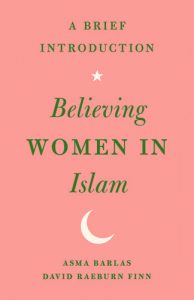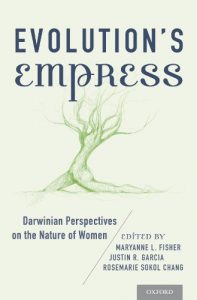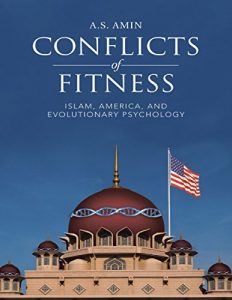Believing Women in Islam: A Brief Introduction by Asma Barlas and David Raeburn Finn is a short book that attempts to present the main ideas of Barlas’s longer work “Believing Women” in Islam: Unreading Patriarchal Interpretations of the Quran.
First, I should mention that I believe that any self-respecting and civilized man should demand that his female mate be his equal–he cannot enter into a relationship with an inferior being because that is damaging to his own self-respect. If I love a woman, I should love her as an infinitely respected person, not as a “woman” who is somehow categorically inferior to men.
I dislike the label “feminist” because I believe focusing exclusively on the rights and issues of any particular group of humans (women, children, men, Sunni Muslims, Jews) always invariably leads to injustice because it promotes a lack of empathy toward those who are excluded. It is far more civilized, humane and constructive to focus on the rights and issues of infinitely respected, dignified and inviolable persons regardless of what grouping they belong to. Just because a boy or man happens to have male sex organs is in no way, shape or form a good reason to consider his emotions and sufferings of any less importance than a woman’s.
In fact, I believe there is something deeply misogynistic about the feminist worldview (not necessarily shared by all feminists) that women are somehow the perpetual victims of history who were little more than animals controlled by men, lacking any sort of courage, agency or self-assertion. I rather subscribe to the worldview that women were full partakers in history–they chose, they self-asserted, they contributed, they were as much full-human members of their societies as the men were. The theory of the patriarchy is the misogynistic theory that men are somehow, miraculously, capable of keeping women at an inferior position compared to themselves, in something of a master-slave relation, perpetually. Are women so mentally and spiritually inferior to men that they should have put up with such a dynamic for all of history until a few feminists came along to enlighten them? I believe this is incredibly demeaning toward women’s courage and capabilities. Yes, throughout history there were various restrictions on women–but the crucial factor is that the women themselves helped maintain these restrictions. They were not like herd animals controlled by men as patriarchy theory claims–they were full partakers in their civilizations who accepted and supported the particular treatment of women in their societies.
Men and women are both equally responsible for the treatment of women in their societies. It is an insult to women and a figment of the imagination to think that the treatment of women in society is entirely or even largely men’s business. I am not saying that things were great for women, but that women themselves, as free human agents, fully contributed to the way women were treated in their societies. Women were not helpless witnesses to the abuse of women as is often portrayed by feminist ideologues. They took part in it, for example by inciting male relatives to keep their wives “in check”, by enjoying the knowledge that a woman they disliked was being abused, and mothers-in-law were throughout the world often quite happy to be utterly abusive toward their female brides. Any theory of women’s status and abuse that ignores women’s support for the abuse of women is ignoring reality for ideological motives.
If the treatment of women was unjust in a society, then a brief survey of the same society would show us that the men too suffered various forms of mistreatment despite their greater freedom of movement. The problem of their societies was not some anti-female conspiracy, it was a lack of appreciation for the rights and dignity of persons. And if the rights and dignity of persons is appreciated and promoted throughout society, women naturally become men’s equals without any need for feminism promoting women’s rights in particular. If you see the infinitely respected person inside a woman, then her woman-ness becomes completely irrelevant to how you love her and treat her. Her personhood is so incredibly important that her sex organs have no way to overshadow it.
Why can’t we have a larger movement inclusive of both men and women that promotes the rights and equality of all persons regardless of their gender or race? This is in fact what classical humanism promotes. Not the arrogant secular humanism that considers humans somehow perfect and needless of guidance, but the humble, self-aware humanism of philosophers like Tzvetan Todorov inspired by the great French humanists. If we take to heart humanist teachings about the dignity and inviolability of persons, this automatically embraces all that moderate feminism truly stands for while avoiding the harms that come from focusing exclusively on the interests of a particular group of humans.
The founding myth of today’s feminism can thus be summarized as “Women were always subhuman until we feminists came to correct matters.” Believing Women in Islam fully assumes the truth of this myth and relies on it for its analysis, and for this reason it has little to offer beyond rehashing already-existing feminist views.
Barlas and Finn write, regarding the apparent lack of sufficient emphasis on women’s rights in the Quran and Sunnah:
God either (1) could not locate or (2) did not care about misogynistic practices in jahili societies. And don't think these stark alternatives are the end of the problem for patriarchal apologists. If God is all-knowing, God either knew and cared or failed to note or care about future generations.
There is a third possibility that they disregard due to the limits of their feminist framework. The third possibility is that women, as full partakers in human civilization, are able to fend for themselves. They support the treatment of women in their own societies even if it has unjust elements the way men support the treatment of men in their societies even if there are unjust elements to this treatment. Their worldview envisions half of society as somehow asleep, or as inferior humans, animals, who were somehow totally incapable of controlling and directing the course of their civilizations. This is utter nonsense–a figment of the feminist imagination. Women are full humans and they are as much responsible for the nature and elements of their civilization as the men are. The Quran and Sunnah lack feminist verses because they consider men and women already equal before God, already equal partakers in civilization, and therefore in no need of classifying one gender against the other and constantly telling one gender to be nice to the other because in this there would be an inherent misogyny. Telling men to be feminist toward women tells them that women are inferior creatures, children, who must be treated not as equals, but as inferiors deserving favors. It is much better and more intelligent for the Quran to simply treat all Muslims as persons, knowing that the men and women are together full partakers in civilization and require no special motivation for one side to avoid mistreating the other–because they are already equal, already they have equal power to shape, form and control their civilization and fend for themselves. The “patriarchy” is the myth that men are clever enough, powerful enough, and women inferior enough, stupid enough, for men to have a position of privilege over women that women are totally incapable of doing anything about. This is a rather low opinion to have of any human, male or female.
Regarding the hijab-related verses of the Quran, they write:
But the so-called modesty verses are specifically addressed to the Prophet and are advisory, not compelling. They are counsel, not commands. Cloaks and shawls in that era covered bosoms and necks, not heads, faces, hands, or feet. Moreover, the counsel was designed specifically to differentiate believing women in Mecca from slaves and prostitutes at a time when jahili men commonly abused both. The jilbab marked believing women as off-limits.
What they recommend is what I call “historical localization” of the Quran. The Quranic verses on the hijab were meant for a specific time and place and not for another. I refute this view of the hijab verses in this article.
So here is the question: Are Barlas and Finn willing to give women the right to interpret these verses for themselves? And if 99% of devout women interpret these verses as requiring the hijab in the modern world, are Barlas and Finn willing to admit that as full humans, these women have the right to interpret these verses in this way even if it goes against the interpretation of the two of them?
I believe in a pluralistic Islam (see my essay) and in autonomous consensus (see my essay). This means that while I respect Barlas and Finn’s particular interpretation of the hijab verses for themselves, I reject any suggestion that this interpretation is any more valid or authoritative than the common interpretation of believing women themselves of these verses–who believe that the verses require the hijab even in the modern world. True feminism requires that you respect the personhood of each woman, and that means respecting them even when they partake in their civilization in a way that you do not like. She is as much a human as you are and you have no right to force your views on her. Barlas and Finn do say that some women wear the hijab as a personal choice for modesty. But it seems that they only consider this a valid choice if it comes out of a person’s personal desire rather than out of their adherence to the classical interpretation of the hijab verses.
In other words, the two of them are not pluralists. They believe ignoring the hijab verses is the only correct interpretation and, if I am not mistaken, they deny the majority of Muslim women the right to interpret the verses in the classical way.
Regarding the famous “wife-beating” verse of 4:34 which establishes the concept of qiwāma (men being in charge of their households), they write:
Many Arabic-English versions mistranslate the key word, qawwamun, then use that to explicitly claim that the verse asserts male privilege: "Men are in charge of women," "Men are protectors," "Men are the managers of the affairs of women," "Men are superior to [women]." Both "maintainers" and "breadwinners" are by all accounts warranted by the Arabic meaning of the word qawwamun. Male privilege, however, is neither suggested nor implied. So how was that conclusion reached?
This is a rather weak line of argumentation. As I discuss in my detailed analysis of verse 4:34 and the issue of wife-beating, the word qawwāmūn is inescapably related to command and being in charge, as one of the earliest exegetes of the Quran, the Prophet’s Companion Ibn ʿAbbās, says. What makes it inescapable is that the verse clearly states that God has given men a “superiority in rank” to women and goes from mentioning qawwāmūn to mentioning the issue of discipline. If this word was merely about men being bread-winners, then it is rather silly to mention (1) a superiority in rank and (2) suddenly switch mid-verse to the issue of discipline. But if the word has to do with authority in the household as all classical exegetes agree, then it makes perfect sense that the issue of discipline would immediately come up.
Their denial of the classical interpretation of this verse therefore requires breathtaking leaps of logic–it is almost as incredible as arguing that the color black is actually white and that it has been only considered black due to a patriarchal conspiracy. The feminist author Amina Wadud recognized the weakness of this line of argumentation and abandoned her efforts to reinterpret them.
Barlas and Finn are unable to come up with any interpretation of verse 4:34 that preserves the ordinary meaning of wa-ḍribūhunna (“and strike them”) that does not encourage violence against women, and for this reason they are forced to use the unconvincing argument that this word is not being used to mean striking. Again, in the free market of ideas that Islam should be, people should be free to understand the Quran on their own terms. And it would be no surprise if history continues to support the classical reading, since it is so obvious and convincing. As for how wife-beating could ever be a thing in a civilized and self-respecting society, I discuss it in detail in my essay on the verse. The short of it is that after establishing men’s authority in the household, the Quran needs to give men the power to enforce this authority (authority without enforcement power is largely useless), and very similar to the way the police is given the right to use violence in extreme circumstances, men too are given this “policing right”. Please read the full essay where I discuss how this does not lead to a reign of terror of the husbands, just as in a well-functioning society the police never have to use violence. If a man’s violence against his wife is unjust, unjustified and abusive, then that is punishable by the Islamic law of scholars like Ibn Ḥazm.
I agree with Amina Wadud that wife-beating has no place among self-respecting and mature adults. This is beyond doubt. Wife-beating should be considered absurd and taboo by the average Muslim. But as I discuss in the essay, the verse has nothing to do with well-functioning, middle class marriages. Verse 4:34 continued to give me trouble until recently when I realized it was about law-enforcement and social order. Please read the essay for the details.
It may be asked how could a man respect his wife as an equal if he is given “authority” in his household? It is similar to the way a project manager respects his colleagues who work under him as equals. He does not treat them as inferior humans, he knows that he has been given authority by the higher ups in order for the enterprise to function properly. In the same way, a man is entrusted with authority by God in order for the household to function properly. Why is it given to men and not women? The answer is that because men and women are different.
See the recent book Evolution’s Empress: Darwinian Perspectives on the Nature of Women which was published by Oxford University Press. The book covers the theories of the great feminist anthropologist Sarah Blaffer Hrdy in detail. There are important differences between males and females in all primates, including humans, both in physical and psychological traits. God’s justification for giving men authority over women must have something to do with these traits.
I am aware that pseudoscientific arguments have often been abused by some of the religious to justify low opinions about women (they are emotional, etc.). I do not in anyway suggest that science conclusively shows that patriarchal family organization is the best. What I argue is that science shows that there are clear differences between men and women, therefore it is not entirely implausible that such differences can be the basis for different roles in the family. Much further scientific research will be needed to show the correctness or falsity of this assertion. Is I have stated, from God’s perspective, men and women are already equal partakers in civilization. By giving men authority over women, God’s purpose is for families to function better. So the scientific question is this: do devout Muslim families that respect this authority function better than other families or not? Is there more happiness or less? Is there more dysfunction, drug abuse and depression in such families or in others? Detailed and unbiased scientific studies would be required to test the full effects of this patriarchal social organization. My contention is that giving men authority in the household leads to objectively better results for everyone involved, including women. It is the final results, the objective effects, that matter here, rather than theoretical discussions about whether this is fair or unfair.
If a woman is made happier by her husband being in charge of the household, what right do you have to take this away from her? Should you not respect her as a person to choose for herself what she is most happy with? If 99% or 90% of devout Muslim women are perfectly happy with men being authorities in the household, what right do you have to attack them for this? It is highly misogynistic to think that all of these women are somehow brainwashed or like herd animals incapable of thinking for themselves–unfortunately a very common, elitist feminist worldview.
The book deals with the issue of two women witnesses’ testimonies being equal to one man’s. This is not a matter I have studied deeply so I do not have much to say about it. I believe that the only thing that would settle the debate in this case is unbiased and detailed scientific studies that show how men and women differ in their accuracy as witnesses. If they are shown to be equal, then this can help us interpret the verse’s meaning better. And if it shown that women and men differ, then those differences should be taken into account.
The writers attack the Islamic toleration for polygyny (having multiple wives), apparently believing that this is inherently unjust to women. But as A.S. Amin shows in his book Conflicts of Fitness: Islam, America, and Evolutionary Psychology, there are strong arguments for polygyny actually improving women’s status and well-being. Again, if two consenting female adults agree to be wives to the same man, and if we respect each female as an infinitely respected person, then we should leave it to themselves to make the choice. Polygyny is somewhat taboo in perhaps all middle class, cosmopolitan Muslim societies, and I consider that a good thing since I do not like men making their wives unhappy by finding new (often younger) wives to be their competitors. But there are cases where it is beneficial, so if a society is properly well-educated and cosmopolitan, we can trust the men and women to make the appropriate choices in most cases.
Believing Women in Islam ends with a discussion of the issues inherent in interpreting the Quran. The book is a good summary of the latest feminist arguments against various unjust practices against women, although it offers nothing new as far as I could find compared to other feminist works like the 2015 book Men in Charge?. Its attacks on concepts like the hijab and qiwāma are likely to prove futile since it is unlikely that most devout Muslim women would find their arguments convincing. It will likely give hope to women already avoiding the hijab and living somewhat feminist lifestyles that their way of life is not entirely invalid in Islamic terms (whether such hope is justified or not is another issue). But when it comes to the Muslim community as a whole, we can expect it to continue just as before–slowly improving its treatment of women as its appreciation for humanist ideals like personhood improves, while continuing to hold onto the plain meaning of the Quranic directives.



